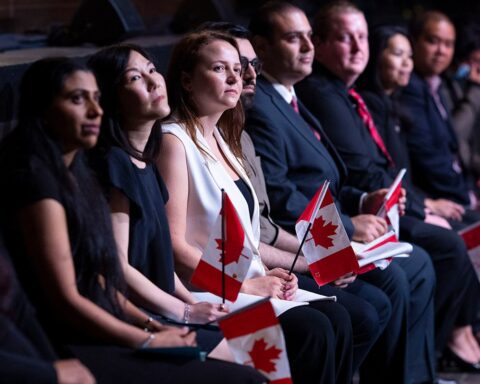A very odd thing happened Saturday in Canada. A poll appeared to show that a majority of my fellow citizens support the screening of potential immigrants by giving them some sort of “values test“, in keeping with a suggestion by a wannabe Conservative leadership candidate, Kellie Leitch. Canada thus appears to be following in the footsteps as countries like Denmark which are putting similar proposals forward.
My first response to the poll results was “it is far too early for April Fools Day” followed by “ok, what have you guys done with my Canada?” The country I know and love does not subject potential citizens to a “values” test and I would have thought that the Canada of my fellow citizens didn’t either. I am wrong, it seems, and so I want to take up this issue.
There is no doubt that extremists of every type reject our values. I spent 15 years studying one particular type of extremism – the Islamist type – and I have written extensively about what it is about us that they reject. It turns out that the list is long: democracy, rule of law, gender parity, minority rights, differences of opinion and everything in fact that does not fit within their very narrow band of beliefs. We do have to stand up for our way of life against these extremists and I think we do a very good job of that in Canada.
It is also reasonable to assume that we as a nation do not want to import more extremists (the truth is, however, that the vast majority of those who radicalize to violence were born or raised here and did so from within our country: i.e. they did not arrive on our shores as flaming radicals). There is very little evidence, however, that we are allowing extremists in and I’m sure there are studies that show that the vast majority of all immigrants – and especially their offspring – adapt to our societies very quickly.
Yes, there are exceptions and there always will be but let us not over-exaggerate the problem. When those exceptions become a threat to us we have the institutions – and very capable ones at that – to deal with them.
A values test
But the very nature of a values test bothers me. I will leave aside who administers it and who evaluates it and how we determine how truthful the responses are – all very good questions by the way – because there is a more fundamental issue: what is a Canadian value?
I think I might know (I should, right, because I was born and raised here?) and it strikes me as reasonable that Canadian values should include:
- a commitment to the rule of law
- a commitment to the democratic system
- a belief in equality of all regardless of who they are (age, gender, sexual orientation, physical ability)
But beyond that, what would qualify as a set-in-stone value? Dress? Food? Hobbies? Ethnicity? Do you see how impossible this becomes? Do all Canadians accept gay marriage? I think not.
Furthermore, each of the fundamental values I listed above are relative and not universal in the sense that each has changed over the decades. Do you want concrete examples?
- for the longest time it was not a crime to beat your child or wife, or at least it was not enforced – so much for the rule of law
- for the longest time women could not vote – so much for the democratic system
- for the longest time minorities (Chinese, Jews) had few rights and homosexuality was a crime – so much for equality of all
Existential menace
We have to recognize that values change over time. They did historically and they will do so in the future. The Canada of 1916 bears little resemblance to that of 2016 and a 100 years hence people will look back at us today in amusement.
We are not threatened with an existential menace from those seeking to come here and undermine our societies. Immigrants come here because of who and what we are, not what they want to make us into. Again, when serious and violent exceptions crop up we will deal with them. And for those who do not dress like us or think like us, what better way to get them to see that there is a different (not necessarily better, just different) way then to expose them to it?
This country was built on immigration and will continue to grow because of immigration (can any of you claim not to be a son/grandson/great granddaughter of an immigrant?). Yes, immigration patterns have changed and so has Canada. We need to be more open to bringing the world’s diversity to our shores, not less. And we need to jettison this harebrained idea of subjecting those who want to live here and become Canadians to a test that is clearly without value.
Phil Gurski worked for more than three decades in Canadian intelligence, including 15 at Canadian Security Intelligence Service (CSIS), and is the author of the Threat from Within and the forthcoming Western Foreign Fighters (Rowan and Littlefield). He blogs at http://www.borealisthreatandrisk.com/blog/
Phil Gurski is a former terrorism analyst at the Canadian Security Intelligence Service (CSIS). He specializes in radicalization and homegrown Al Qaeda/Islamic State/Islamist-inspired extremism and has published several books, including the forthcoming When Religions Kill: how extremists justify violence through faith.” He is a member of New Canadian Media’s board of directors.





